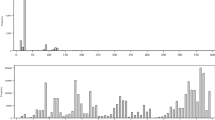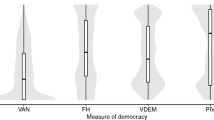Abstract
It is widely believed that electoral pressures cause legislators to favor government spending programs. This “electoral theory of spending” is shown to encompass two core hypotheses: (1) the electoral consequences hypothesis, which states that support for spending programs improves the representative's electoral showing; and (2) the legislator insecurity hypothesis, which states that greater electoral insecurity leads representatives to be more in favor of spending programs. A test of these ideas using spending scores for U.S. representatives in 1986 finds that neither hypothesis is supported by the data.
Similar content being viewed by others
References
Bennett, J.T. and DiLorenzo, T.J. (1983). Underground government: The off-budget public sector. Washington, DC: Cato Institute.
Bernstein, R.A. (1989). Elections, representation, and congressional voting behavior. Englewood Cliffs: Prentice Hall.
Domenici, P. (1980). Can Congress control spending? Policy Review 14 (Fall): 49–65.
Downs, A. (1960). Why the government budget is too small in a democracy. World Politics 12 (4): 541–563.
Feldman, P. and Jondrow, J. (1984). Congressional elections and local federal spending. American Journal of Political Science 28 (1): 147–164.
Fiorina, M.P. (1977). Congress keystone of the Washington establishment. New Haven: Yale University Press.
Garand, J.C. (1988). Explaining government growth in the U.S. States. American Political Science Review 82 (3): 837–849.
Hibbing, J.R. (1984). The liberal hour: Electoral pressures and transfer payment voting in the United States Congress. The Journal of Politics 46: 846–865.
Lowery, D., Konda, T. and Garand, J. (1984). Spending in the states: A test of six models. Western Political Quarterly 37: 48–66.
Payne, J.L. (forthcoming). The culture of spending.
Author information
Authors and Affiliations
Rights and permissions
About this article
Cite this article
Payne, J.L. Elections and government spending. Public Choice 70, 71–82 (1991). https://doi.org/10.1007/BF00239345
Received:
Accepted:
Issue Date:
DOI: https://doi.org/10.1007/BF00239345




